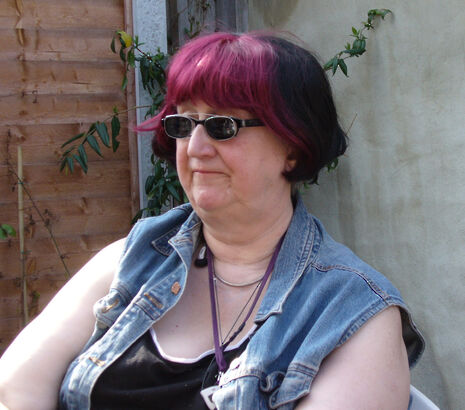CUSU LGBT+ host alternative event to Germaine Greer
Trans feminist activist Roz Kaveney condemns Greer’s ‘vicious personal attacks’ and looks to the future of a more trans positive feminism

CUSU LGBT+ and CUSU Women's Campaign hosted a joint event last night to celebrate and discuss the history of trans feminism, and think through how feminism can be made more trans-inclusive, in response to the Union's invitation to invite Germaine Greer to speak at the same time as CUSU LGBT+ drinks were due to take place.
Upon finding out that Germaine Greer had been invited to speak at the Union, CUSU LGBT+ called for the Union to rescind their invitation. This request was denied.
In her welcoming speech, CUSU Women’s Officer Amelia Horgan was keen to stress that CUSU’s decision to collaborate with CUSU LGBT was motivated by a desire to prove that "Germaine Greer is not a feminist icon".
CUSU LGBT+ flyers distributed at the event assert: "To invite Germaine Greer back to speak in Cambridge condones her transmisogynistic words and actions."
CUSU LGBT+ trans rep and main event organiser Robin Cumming thanked the audience for taking part in this "action of solidarity".
Guest speaker Sarah Brown asserted "It’s OK for us to not want to invite problematic people because the repercussions this might have on marginalised and vulnerable communities".
The centerpiece of the event was the talk by the guest speaker, trans feminist activist Roz Kaveney, a British writer, critic, and poet, best known for her critical works about pop culture and for being a core member of the Midnight Rose collective.
Kaveney's works include fiction and non-fiction, poetry, reviewing, and editing. She has also contributed to several newspapers such as The Independent and The Guardian. She is a founding member of Feminists Against Censorship and a former deputy chair of Liberty, as well as acting as deputy editor of the transgender-related magazine META.
Gibson described Kaveney as an "amazing repository for trans community history", which is, for the most part, not recorded.
The event was attended by a large and diverse group, representing a mix of colleges and year groups. Many had to sit on window sills and the floor, with the door of the room being left open to accommodate the crowd who gathered in the corridor as the talk progressed.
Em Travis, one of the event organisers, was pleasantly surprised by the impressive turnout, which Travis said was twice the size they had anticipated.
The talk took place in a mindful and open atmosphere created by the strict and very comprehensive guidelines – including the use of verbal trigger warnings when addressing potentially offensive or harmful content – to which all audience members closely adhered.
Kaveney’s speech opened with a few anecdotes about her personal experience with Germaine Greer, providing valuable insight into Greer’s character.
Kaveney described Greer as "so petty" and condemned her for her "vicious personal attacks" on members of the trans community, such as April Ashley MBE, English model and restaurant hostess and one of the first people in Britain known to have had sex reassignment surgery.
Kaveney’s stories revealed that Greer has displayed a highly antagonistic attitude to her. In the late 1990s, Greer refused to take part in the writing of the reference book The Cambridge Guide To Women Writing In English because Kaveney was involved in the project. Greer allegedly refuses to be in the same room as Kaveney, and actively avoids events she knows Kaveney will be attending.
The discussion broached the subject of Greer’s transphobia but also briefly touched on Greer’s literary contributions as a lecturer and fellow at Newnham College, Cambridge.
Kaveney reproached Greer for "not living up to her promises."
"She’s never been the great scholar she was meant to be because she got sidetracked," she argued.
Kaveney’s recounting of her personal history was interwoven with the history of trans developments; an account full of revealing anecdotes about big personalities. As Kaveney candidly admitted, "I am such a name dropper." In particular, the speaker talked about the London gay liberation movement of the 1970s and shed light on the anti-trans sentiment within the gay liberation and feminist separatist movement.
Certain members of this movement described the trans community as "unnatural" and criticise trans activists for "confusing the issue".
Kaveney personally experienced these anti-trans sentiments when certain activists forcefully dissuaded her from transitioning in her early twenties because this was condemned as "selfish".
The talk, however, ended on a positive note, with Kaveney’s optimistic and encouraging words, "It’s still crap but it’s getting better. There are some awesome young trans people. My work here is done."
 Comment / Plastic pubs: the problem with Cambridge alehouses 5 January 2026
Comment / Plastic pubs: the problem with Cambridge alehouses 5 January 2026 News / Cambridge businesses concerned infrastructure delays will hurt growth5 January 2026
News / Cambridge businesses concerned infrastructure delays will hurt growth5 January 2026 News / New movement ‘Cambridge is Chopped’ launched to fight against hate crime7 January 2026
News / New movement ‘Cambridge is Chopped’ launched to fight against hate crime7 January 2026 News / AstraZeneca sues for £32 million over faulty construction at Cambridge Campus31 December 2025
News / AstraZeneca sues for £32 million over faulty construction at Cambridge Campus31 December 2025 Interviews / You don’t need to peak at Cambridge, says Robin Harding31 December 2025
Interviews / You don’t need to peak at Cambridge, says Robin Harding31 December 2025









